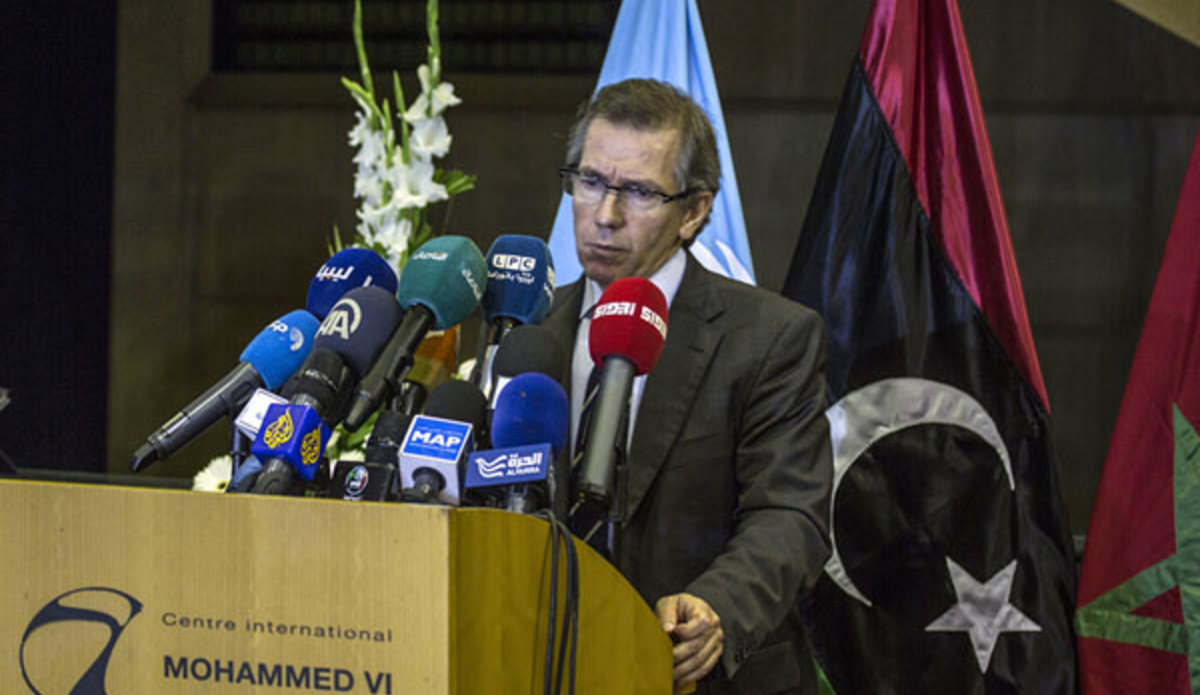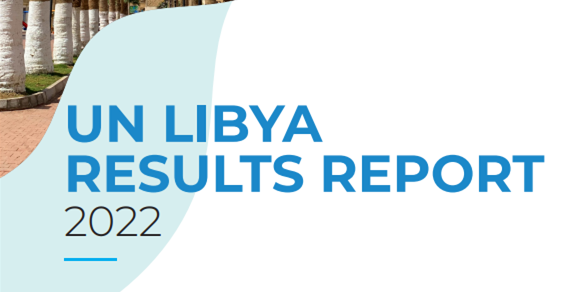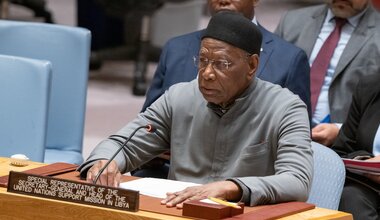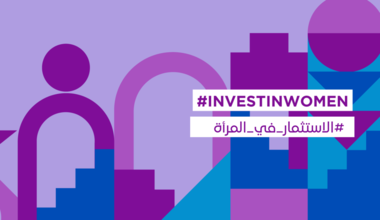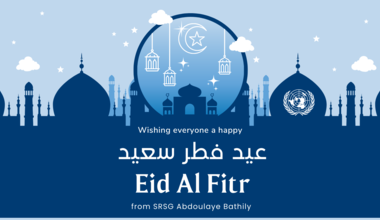Excerpts from SRSG Bernardino Leon’s press conference in Skhirat, Morocco, 13 September 2015:
Excerpts from Special Representatives of the Secretary-General for Libya Bernardino Leon’s press conference in Skhirat, Morocco, 13 September 2015
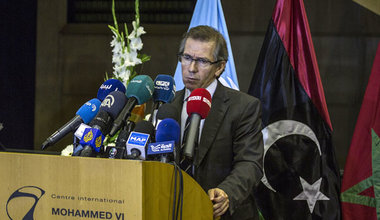
After long hours of discussions, we have reached what we consider is a consensus on the main elements. We are going to distribute the text to the parties and we are going to work on this text tonight, and we believe that this text will receive the total support of the parties and will be voted by the two parties, the HoR (House of Representatives) and the GNC (General National Congress), and will be endorsed by the rest of the participants in the coming days.
It has been a very long day. As you know, it's a very long night. The first element I would like to enhance is that the parties have placed above any other consideration the interest of their country. So I think this is a very important day for Libya. It is a very important day for the Libyans because their representatives have worked with political will, with flexibility with generosity to reach this agreement.
They have been able to go through their differences, and we started this morning with a number of important differences – six, seven, eight points where the differences were important - and they have been able to discuss and to overcome their differences on these issues.
Now when we will distribute tomorrow morning this text, which we believe will be a consensus text for all of them, the representatives from the GNC will leave Skhirat for 48 hours. They are going to submit the text and they are going to come back after these 48 hours with their names to propose candidates for the national unity government. And we hope that in the following two days we will have the possibility to reach consensus on the unity government. As you know, the other participants have already provided their names, their candidates, the House of Representatives, and other participants, most of them have made proposals, and I hope that the good momentum, the good spirit that we have tonight will prevail in the coming and it will be possible to have this text ready to be signed by the 20th of September.
We know that it is going to be difficult. We know that it is going to require a lot of work, but we believe that it will be possible to reach this deadline of the 20th of September with an agreement that will be signed.
I want to thank, to express my gratitude to the Kingdom of Morocco once again, for hosting us, the international community, the ambassadors of the countries that are supporting the process, their role has been important in accompanying the process, the team that has done a fantastic job to make this possible, and to all of you who have been patiently accompanying us especially in long days like today.
Question: You said 6, 7, points of differences, can you develop on it?
LEON: well, practically I think that in all the chapters of this agreement we had this morning different levels of differences, some of them were more important (such as) composition of the State Council, how to deal with the forming of the government, and the administration in the near future, decisions, or decision-making process in different chapters of the agreement, some of the final positions that require some fine-tuning, some of the articles relating to the legislative issues, relations between internal legislation and international legislation, dates. So, it has been a long day from this point of view. We have to find consensus formulas for all these differences. And I think that we will only know when they will vote. We are not at this stage, we cannot say that this text is going to be voted by both sides, but we sincerely believe that this is the best we can produce in this context, in this moment in which there are important differences in the Libyan society.
What the participants are projecting here is these differences, which are real, which exist on the ground. Libyans have to build trust. They have to build this sharing power scheme, and I think that the country has an opportunity. And what I want to enhance is that they want to do this for their country but they also think that solving their differences politically, starting the transition again is a very important message for other countries in the region that are going through conflict and need equally to solve politically their differences.
Question: Were the amendments introduced to the text that was signed before or to the annexes?
LEON: well, basically most of the issues we have been discussing today are part were from the annexes or the final provisions. But equally some of these issues, if both sides agreed – the House of Representatives and the Congress in Tripoli - will agree with this proposals will also amend the text in not very important points, in some, I would say, around four, five very concrete points. I would say that small amendments, no big changes. So the basis of the text remains the same, with some amendments. Now the nine remarks that were proposed by the Congress have been introduced, have been addressed in this whole package, and the whole package, of course, means the final provisions, the annexes and also the main text.
Now we know for the parties that signed on 12 July here in Skhirat this is not an easy decision. My call for all of them, and my call for the Libyans is that even if we can understand that they feel disturbed, and they feel frustrated because this text will have some changes, but that in this very last effort, in this very last moment it is possible to overcome the crisis in Libya they are generous and they accept these changes for the sake of their country.
Both sides have compromised. This is not one side taking everything. I have repeated this many times. This is a win-win solution, and I think that really there is a good level of compromise from both sides and I insist, my plea, my call for the Libyans, for all of them, all those who signed on July 12 is that they are generous and they accept that this is necessary to bring everybody on board. And it is possible to have them united and through this union to start rebuilding the state and addressing the problems Libyans has: terrorism, migration, starting the democratic transition again, recovering economic stability. All these challenges can only be addressed through this union and we have the opportunity. This is the first time maybe after one year that we have the possibility to make it and to have this agreement with the all the parties, all the key parties in Libya onboard.
 United Nations Peacekeeping
United Nations Peacekeeping UN
UN
